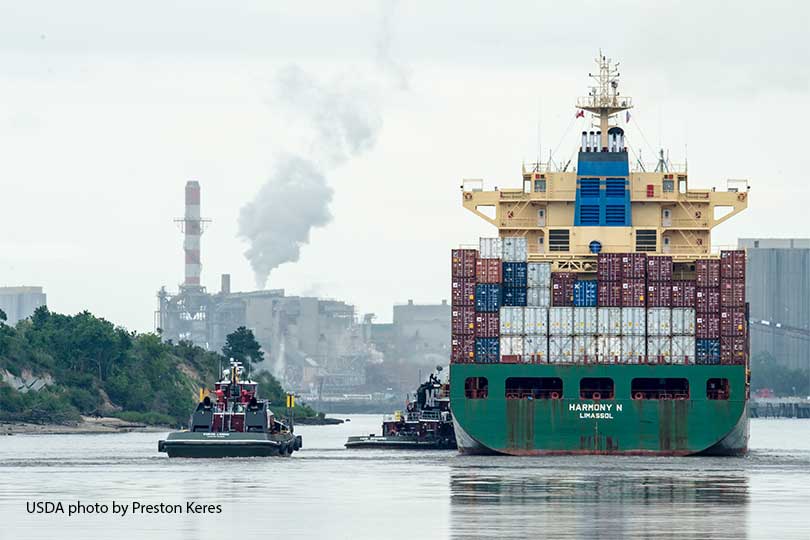By Jessica Domel
Multimedia Editor
The largest market for American beef took action Friday that will likely raise costs, decrease demand and give Australia a competitive edge over the U.S.
Japanese officials announced Friday imports of frozen beef had reached a predesignated level that allows them to increase the tariff, or tax, on frozen beef from 38.5 to 50 percent to protect Japanese producers.
The 50 percent tariff goes into effect Tuesday, Aug. 1.
The announcement came shortly after President Donald Trump named Japan among countries contributing to the U.S.’ trade deficit, according to the Wall Street Journal.
“I am concerned that an increase in Japan’s tariff on frozen beef imports will impede U.S. beef sales and is likely to increase the United States’ overall trade deficit with Japan,” U.S. Secretary of Agriculture Sonny Perdue said. “This would harm our important bilateral trade relationship with Japan on agricultural products.”
In Japan, frozen U.S. beef is used in popular fast food dishes, primarily beef bowls.
“[The tariff increase] would also negatively affect Japanese consumers by raising prices and limiting their access to high-quality U.S. frozen beef,” Perdue said.
U.S. exports of beef and beef products to Japan totaled $1.5 billion last year.
The U.S. and Australia account for 90 percent of the frozen beef used in Japan. Australia supplies about 55 percent of the frozen beef, while the U.S. supplies 35 percent.
Japanese officials reported Friday 89,253 metric tons of frozen beef have already been imported this quarter, which allows them to increase the tariff on frozen American beef.
Tariffs on Australian beef were not increased due to a bilateral trade agreement between the countries.
According to the U.S. Meat Export Federation (USMEF) , the higher duty could make American frozen beef more expensive than Australian beef in Japan.
“USMEF will work with its partners in Japan to mitigate the impact of the safeguard as much as possible,” USMEF President and CEO Phillip Seng said. “We will also continue to pursue all opportunities to address the safeguard situation by encouraging the U.S. and Japanese governments to reach a mutually beneficial resolution to this issue.”
The tariff increase does not extend to chilled beef, which could be another option for fast food buyers who are priced out of frozen American beef imports.
Although that is an option, USMEF reports it is unclear how many will make the switch given the associated higher costs, the timing and shelf life implications.
Following the announcement by Japan Friday, the National Cattlemen’s Beef Association (NCBA) also expressed its disappointment in the increased tariffs.
“Anything that restricts our sales to Japan will have a negative impact on America’s ranching families and our Japanese consumers. NCBA opposes artificial barriers like these because they unfairly distort the market and punish both producers and consumers,” NCBA President Craig Uden said. “Nobody wins in this situation.”
Uden went on to say he hopes the Trump Administration and Congress realize this unfortunate development underscores the urgent need for a bilateral trade agreement with Japan.
Japan also increased tariffs on frozen beef from Canada and New Zealand as they do not have a free trade agreement with the country either.
According to the Wall Street Journal, this is the first time in 14 years the safeguard that allows the increased tariffs has been triggered. The tariff increase is mandated under a 1994 trade deal framework.
Perdue has asked representatives of the Japanese government to make efforts to address American concerns and the harm that could be done to American ranchers and Japanese customers.
The safeguard tariff will remain in place through the end of the Japanese fiscal year, which is March 31, 2018


Well, now who could have imagined that withdrawing from the TPP (which would have been a benefit for agricultural exporters in this country and which would likely have superseded the 20+ year old trade bill that allowed these tariffs) might lead to something like this? Thank the Lord it’s only in place for a year.
But after that bit of stupidity, it’s time for our self-aggrandizing negotiator in chief to get off his twitter, stop making inflammatory comments about our allies and trading partners, and follow the NCBA’s advice to begin work on a bilateral trade agreement with Japan. Sadly, that ain’t gonna happen.